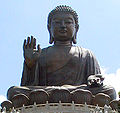Another time [the Buddha] said, “Suppose a man is struck by a poisoned arrow and the doctor wishes to take out the arrow immediately. Suppose the man does not want the arrow removed until he knows who shot it, his age, his parents, and why he shot it. What would happen? If he were to wait until all these questions have been answered, the man might die first.” Life is so short. It must not be spent in endless metaphysical speculation that does not bring us any closer to the truth. – Thich Nhat Hanh, Zen Keys
Buddhism is an interesting religious tradition. In fact, it is not even always considered a religion, but rather a family of beliefs and practices. Buddhists trust in what are referred to as the Three Jewels: the Buddha, the Dharma and the Sangha which are respectively the Awakened One, the Teachings and the Community.
The Buddha is believed to have been a man named Siddhartha Gautama who shared many teachings during his lifetime sometime around the 5th century B.C. The teachings of the Buddha tend to shy away from the so-called ‘Big Questions’ of life. This is generally seen as demonstrative of his aversion to contemplating these issues, as they distract from the pursuit of true knowledge known as Enlightenment, a state free from worldly pleasures and suffering. Experience is emphasized over philosophical musings, although Buddha did not actively dismiss philosophy.
The quote at the beginning of this article demonstrates the Buddhist theory of why philosophical musings on the meaning of life are futile and/or distracting. It can be seen as Nihilistic, but in fact is better described as Pragmatic.
The arrow (life) should be addressed, rather than the shooter (is there meaning/God), the source (our/the Universe’s origins), or why he was shot (why are we here). This is a fairly unique stance for any religious or even quasi-religious tradition, as it leaves out the usual purpose of humanity: serving a higher power. However, the Buddhist teachings are extremely interesting and can give insight to not only the meaning of life, but also to our life as it is.

No comments yet.